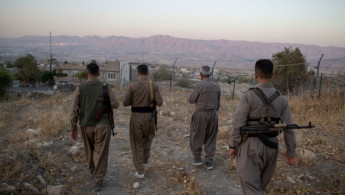Iran pressures Baghdad to expel Iranian Kurdish groups from Iraqi Kurdistan region
Iran has reportedly increased pressure on the Iraqi federal government, as well as the Kurdistan Regional Government (KRG), to implement a recent security pact for tightening security around the frontiers between Iran and Iraq.
A border security agreement was signed by the two countries in March and primarily aimed at tightening the frontier with Iraq's Kurdish region, where Iranian Kurdish opposition parties have set up bases.
Under the signed security deal, Iraq pledges it would not allow armed groups to use its territory in the Iraqi Kurdish region to launch any border-crossing attacks on neighbouring Iran.
On Saturday, Iran's foreign ministry summoned the Iraqi ambassador to Tehran and handed over a "strongly protested" complaint against the ongoing presence of the Kurdish groups in the region.
"The director of the first department of the Persian Gulf at the Iranian Foreign Ministry reminded the Iraqi ambassador that the anti-Iran meeting in the KRG and the activities of terrorists in that region run counter to a recent security agreement between Tehran and Baghdad," reported Tasnim News Agency, which is close to Iran's Islamic Revolution Guards Corps.
Iranian #Kurd prisoner Saman Darvishi was killed due to beating and torture by security forces in #Tehran (Fashafuye) prison on 8 May 2023. https://t.co/YunuNJCaoz
— SAMRI (@SAMRIReports) May 12, 2023
Iran accuses the Iranian Kurdish parties of "affiliating" with Israel; Iran often voices concern over the alleged presence of the Israeli spy agency Mossad in the semi-autonomous Kurdish region.
The Islamic regime also accused Kurdish parties of stoking the nationwide protests, triggered by the death in custody in September of Iranian Kurdish woman Mahsa Amini.
Kurdish groups, in turn, strongly deny these accusations, saying that their activities are mainly "peaceful".
"Iran now is putting more pressure on the Iraqi government in Baghdad to make a decision for expelling the Iranian Kurds from Iraq," a well-informed source close to both the Iraqi and Iranian officials told The New Arab on condition of anonymity.
"Iran partly pressures the ruling parties in the KRG because Tehran knows it is very difficult for them to decide to expel their fellow brothers," the source added.
The source further said that Tehran wants Iranian Kurds to be entirely expelled from Iraq and sent to a third country, similar to the case of People's Mujahedin of Iran, also known as MEK (Mujahedin-e Khalq), which is an Iranian political-militant organisation opposing Iran's Islamic regime.
"Until now, no third country has expressed its readiness to accept the Iranian Kurds. If the Iraqi government and the KRG decide to expel them from Iraq, then Iran Kurds will have no options other than accepting the offer or returning to Iran where they face legal prosecution," the source noted.
More than 3,000 MEK members from Iraq were relocated to Albania between 2013 and 2016.
Two officials from the Iranian Kurdish parties, who also spoke to TNA on condition of anonymity, said that they have not received any formal request from the Iraqi government or the KRG regarding the disarmament of the Iranian Kurdish group or the possible relocation of these groups to a third country.
One of the officials said his party is mainly engaged with "peaceful" activities inside Iran, including urging Kurds in Iranian Kurdistan to launch a general strike in protest of the killing of hundreds of innocent protesters by the Iranian security forces.
"We will reject the relocation to a third country because we consider the Iraqi Kurdistan region as part of our homeland, the greater Kurdistan, scattered among Iran, Iraq, Turkey and Syria," the source stressed.
In November, Iran launched cross-border missile and drone strikes on the Komala bases in Zirgwez and the bases of the Kurdistan Democratic Party of Iran (KDPI) near Koya town of Erbil province.
At least three persons were killed in the two separate attacks on KDPI bases near Koya.




 Follow the Middle East's top stories in English at The New Arab on Google News
Follow the Middle East's top stories in English at The New Arab on Google News


